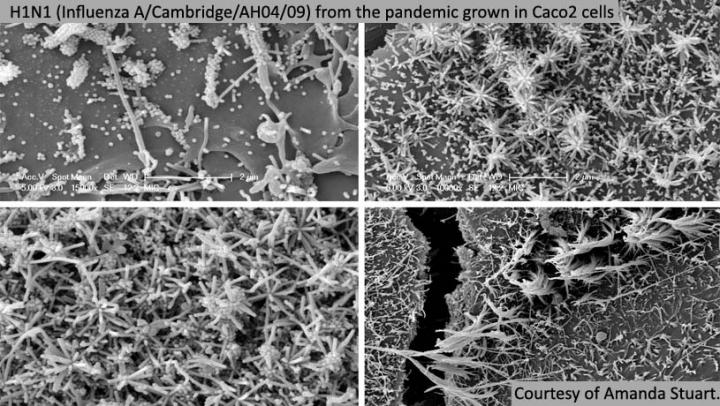Gene could determine risk of developing life-threatening flu
Roslin scientists are part of a collaborative team that has found some people may be at risk of a severe reaction to flu because they are not protected by a key gene.

Roslin scientists are part of a collaborative team that has found some people may be at risk of a severe reaction to flu because they are not protected by a key gene.
Researchers have identified for the first the first time a human gene responsible for our susceptibility and response to flu and other viruses.
The gene - IFITM3 - produces a protein that protects cells against infections and is thought to be critical in the immune system's response against viruses such as Swine Flu.
The study found that patients who ended up in intensive care with potentially-fatal complications after developing flu were much more likely to have a variant of this gene, that did not protect against the virus.
The research was led by the Wellcome Trust Sanger Institute working in collaboration with scientists from The Roslin Institute at the University of Edinburgh.
The study analysed DNA from 60 patients treated in Scottish Intensive Care Units during the 2009/10 swine flu pandemic.
Families were approached for permission to take blood samples from the patients, who had been previously fit and healthy but had developed life-threatening lung complications from flu.
Scientists found that 5.3 per cent of patients in intensive care with flu had a variant of IFITM3. This was a significantly higher proportion of the gene variant than found in the general population, which was 0.3 per cent. The findings strongly suggest that it plays a key role in flu susceptibility and reduced ability to fight the infection.
This part of the study, called the genetics of influenza susceptibility in Scotland (GenISIS) started when the swine flu pandemic hit Scotland. It was led by clinicians in NHS Lothian, with intensive care units across Scotland collaborating through the Scottish Critical Care Trials Group and funding from the Chief Scientist's Office.
DNA was then extracted from these samples by researchers at The Roslin Institute, prior to further analysis at the Sanger Institute.
While most people who may contract flu during a pandemic will recover well and not experience serious symptoms, some may develop a catastrophic and potentially fatal illness and need to be treated in intensive care. This can include otherwise healthy, young people.
The answer as to why some people become seriously affected by flu and others don't was a mystery but this study shows for the first time it may be because they are more genetically susceptible to the virus.
The studies of patients followed initial studies at the Wellcome Trust Sanger Institute that identified the IFITM3 gene in mice.
Mice without the healthy version of the gene were much more likely to have severe symptoms than mice with the normal IFITM3 gene.
The research also involved collaboration with institutes from the United States as well as the MOSAIC consortium, which provided blood samples from flu patients in intensive care in England.
Flu can be devastating in the very young and elderly, but some previously fit young people can also develop life threatening lung problems.
Many young people required prolonged periods in intensive care during the swine flu pandemic, and we had little idea why this small number of people was so severely affected. This study provides some clues as to why this may happen. It opens avenues for future research by clinicians and scientists to develop ways of predicting who might be at risk and where to focus efforts to find new treatments for severe viral infections.
The study is published in the journal Nature.
When the protein produced by the normal IFITM3 gene is present in large quantities, the spread of flu in the lungs is hindered. When protein levels are lower the virus can spread more easily causing severe symptoms.
Our research is important for people who have this variant as we predict their immune infections defences could be weakened to some virus infections. Ultimately as we learn more about the genetics of susceptibility to viruses, these people can take informed precautions, such as vaccinations to prevent infection.
For more information please contact:


